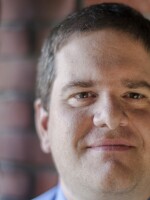http://stream.publicbroadcasting.net/production/mp3/kplu/local-kplu-984822.mp3
SALEM, Ore. - An old proverb goes like this: "Each one, teach one." It means that everyone is responsible for passing along knowledge to the next generation. That's true in many professions. A senior surgeon will demonstrate a high-stakes operation to a young medical student. A veteran fire-fighter will show the ropes to a fresh-faced rookie.
But in Northwest schools this week, many new teachers will stand in front of a classroom for the very first time, with no one to turn to for advice. Some young teachers are lucky enough to get help from a trained mentor. But such mentoring programs are far from reaching every new teacher.
Students fill the halls of Judson Middle School in Salem. They're here to get oriented for the upcoming school year.
Some of them give a familiar wave to Eric Phillips. He teaches Spanish here at Judson. The tall twenty-something towers over his students. Nobody was welcoming him back last year. Then, he was fresh out of college, not quite sure of what to expect.
"You can be prepared to a degree. You can read the books about management and stuff like that," Phillips says. "But it doesn't do a lot unless you're in a classroom."
But Phillips was paired up with a mentor -- a veteran teacher who would often sit in on Phillips' classes and observe him -- something his students found amusing.
"People would be like, is that your mom?" he says.
Phillips' mentor does more than simply observe. He says he gets the most out of the process when the two sit down and reflect.
"One of the things she does when she comes in for our prep periods, is gives us a piece of paper and we fill it out together. What's working, what do I want to work on, where do I want to be."
His mentor is Karen Herinckx. She works with teachers for two years before they fly completely solo. For her, mentoring is a full-time job, thanks to a state grant.
"Last year I worked with 23. Some of my counterparts worked with up to 27 teachers," Herinckx says. "So just like the teachers' classrooms are too full, our caseloads were fuller and we weren't able to be as thorough as we wanted."
Herinckx says she's down to a more manageable 17 teachers this year.
The concept of an experienced professional guiding a newcomer may be pretty basic, but the money that pays Herinckx to be a full-time mentor comes from a state program that's relatively new. That's because it's taken awhile for the concept of mentoring to catch on in the education field.
That's according to Bev Pratt. She's with the Chalkboard Project, a Portland-based education advocacy group. She says that for the longest time nobody really was paying attention to whether inexperienced teachers were managing to keep their heads above the water.
"For a long time teaching was looked at sort of as if you were the teacher in Room 101, you were the queen or king of Room 101, nobody bothered you," Pratt says. "That was your room, that was your kingdom."
Of course, it's likely that informal mentoring has taken place among teachers for generations. But education experts say the most effective mentors are those who have been trained to pass along their expertise.
Randy Hitz is dean of the Graduate School of Education at Portland State University. He says it's easy for a professional in any field to be really good at something but not fully understand why they're good at it.
"You take a baseball player who hits a lot of home runs," Hitz explains. "They may not be the ones who really understand the mechanics of it and why they're effective as they are. And that certainly is true for teachers."
That's why mentoring advocates stress the need for training. Oregon Democratic State Representative Betty Komp is a former educator herself. She says she did a lot of soul-searching as a beginning teacher.
"My first few months I would leave school and say 'Gosh, did they learn anything at all? What did I do right, what did I do wrong?'" Komp recalls. "And if I'd had a mentor, then I could have had some guidance."
Komp is one of the chief advocates for teacher mentoring programs in the Oregon legislature. State funding for the program has been mostly stable in Oregon since it started four years ago. But backers of the effort say nearly twice as much is needed in order to fully reach new teachers.
In Washington state a similar program was nearly eliminated this year until lawmakers backtracked on a decision to get rid of it. The resuscitated version will only fund mentors in 15 districts.
On the Web:
Copyright 2011 Northwest News Network







